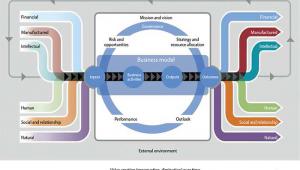Public sector organisations, whether domestic or international, are being increasingly challenged to maintain or improve outcomes within the same or reduced budgets. Take, for example, the UK’s National Health Service, whose budget has been stretched for the last decade, and the weight of pressure they have come under in this time has been close to breaking their system on numerous occasions.
On the back of decade-long public sector spending restraint in the aftermath of the global financial crisis, with Brexit on the horizon and many global economic and environmental uncertainties potentially affecting the UK’s varied public services, communicating how - and how well prepared - public sector organisations are to achieve stable or improved outcomes is critical to enhanced public accountability in an age of transparency.
What is integrated reporting?
Integrated reporting promotes a more holistic and efficient approach to reporting that draws on different reporting strands to communicate the full range of factors that materially affect the ability of an organisation to create value over time. Choosing a reporting framework that promotes efficiency and the breakdown of organisational silos is especially important for public sector bodies.
At the heart of integrated reporting is the concept of multiple ‘capitals’, or the interconnected resources organisations use to create value. This means building into an organisation’s governance an understanding that financial, manufactured, human, intellectual, social and relationship, and natural factors all work together to ensure its long-term sustainable success.
Public sector organisations have a unique value creation story to tell, as more often than not they are striving to achieve innovation while delivering services and achieving positive change to society. This demands the use of intangible capitals, such as social, human and natural resources. It is important to communicate clearly to all stakeholders how this is achieved.
The International Integrated Reporting Framework was developed to help organisations implement integrated reporting. It is principles-based, allowing organisations to innovate and develop their reporting in the context of their own strategy, key drivers, goals and objectives. Nowadays, over 1,600 organisations in more than 65 countries are voluntarily adopting integrated reporting to enhance the way they think, act and communicate.
Importantly, the framework can be used to support integrated thinking to improve the performance of public bodies too, whether government agencies and entities like cities, local government, health and educational institutions, and non-governmental organizations (NGOs), by breaking down internal silos and forging better connections between the interlocking capitals to release more value.
World Bank
The World Bank Group (WBG) is working with the IIRC through a newly launched integrated thinking and strategy special interest group, helping to build an understanding of how organizations can implement the behavioural changes necessary within an organization to make integrated reporting a success.
The WBG moved to integrated reporting, following the introduction of a new strategy that imagined all of its institutions working together as one WBG to provide, in their words, “a package of modified solutions for our clients, working with all of our partners to rally private investment and develop effective public institutions, and ensuring that development progress is environmentally, socially and economically sustainable”.
The International Integrated Reporting Framework resonated very well with what the WBG “was and is aiming to achieve internally through the implementation of its new strategy – Integrated Thinking and Integrated Management”, however they also saw “significant benefits in their role at the International Integrated Reporting Council, as a development institution of promoting the widespread adoption of by our partners and clients”.
What did the WBG learn?
The WBG learnt the importance of embedding the concept of integrated reporting into the organisation’s culture from the perspective of how it could help to facilitate integrated thinking; the importance of senior management support for the initiative, and lastly that information asymmetry was extensive throughout their reporting, and if not dealt with effectively, could have hindered their ability to achieve their strategy. Indeed, a key challenge in implementing the International Integrated Reporting Framework was dealing with the perception that it was just another reporting exercise.
The concept of integrated thinking and management is not new, yet organisations are still plagued with the effects of information asymmetry, siloed thinking, and other factors that detract from their ability to create lasting value; the WBG is no exception. The framework provides a holistic approach to addressing these issues effectively while at the same time promoting a clear and concise articulation of WBG’s value creation story, focusing on the full range of value drivers across the financial and pre-financial.
Relevant to all public bodies, integrated reporting is also enabling them to demonstrate, measure and monitor how they create value through their various activities, and alignment with their strategy.
Advancing Leading Practice
At the IIRC, we believe that better information can help to improve governance, accountability, and rebuild trust in a post-crisis global economy where raising capital and promoting sustainable growth are essential.
After WBG’s adoption, the IIRC developed a guidance document with the WBG and CIPFA which provides guidance for public bodies around the globe to help them think holistically about their strategy and plans, make informed decisions and manage key risks in order to build stakeholder confidence and improve future performance, and for those starting out, encourages messaging for public sector organizations on how they can start their integrated reporting journey.
We also encourage organisations to participate in our Integrated Thinking & Strategy special interest group.
This group offers organisations the opportunity to share thinking about developing strategy across multiple capitals, learn from world leaders and co-create a common world view of integrated thinking that is globally relevant to help build resilient, future-fit businesses.
In a short space of time integrated reporting is becoming an essential strategic tool for public sector organisations to demonstrate their enduring relevance to all stakeholders and build trust in the capacity of public investment to create sustained value, which is critical to achieving economic and social progress.














